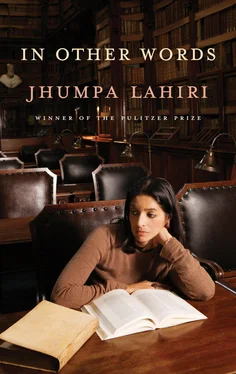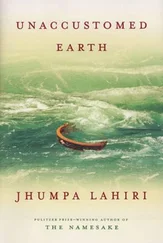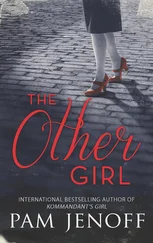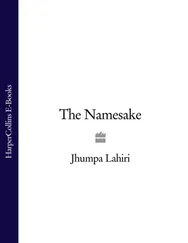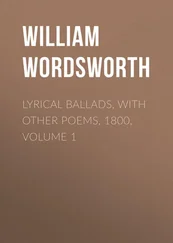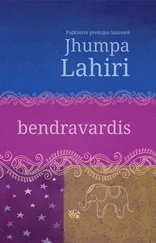I love this trip. I go out of the house, leaving behind the rest of my life. I don’t think about my writing. I forget, for several hours, the other languages I know. Each time, it seems like a small flight. Awaiting me is a place where only Italian matters. A shelter from which a new reality springs forth.
I am very fond of my teacher. Although for four years we use the formal lei, we have a close, informal relationship. We sit on a wooden bench at a small table in the kitchen. I see the books on her shelves, the photographs of her grandchildren. Magnificent brass pots hang on the walls. At her house, I start again, from the beginning: conditional clauses, indirect discourse, the use of the passive. With her my project seems more possible than impossible. With her my strange devotion to the language seems more a vocation than a folly. 
We talk about our lives, about the state of the world. We do an avalanche of exercises, arid but necessary. The teacher corrects me constantly. As I listen to her, I take notes in a diary. After each lesson I feel both exhausted and ready for the next. After saying goodbye, after closing the gate behind me, I can’t wait to return.
At a certain point the lessons with the Venetian teacher become my favorite activity. As I study with her, the next, inevitable step in this strange linguistic journey becomes clear. At a certain point, I decide to move to Italy.

I choose Rome. A city that has fascinated me since I was a child, that conquered me immediately. The first time I was there, in 2003, I felt a sense of rapture, an affinity. I seemed to know it already. After only a few days, I was sure that I was fated to live there.
I have no friends yet in Rome. But I’m not going there to visit someone. I’m going in order to change course, and to reach the Italian language. In Rome, Italian can be with me every day, every minute. It will always be present, relevant. It will stop being a light switch to turn on occasionally, and then turn off.
In preparation, I decide, six months before our departure, not to read in English anymore. From now on, I pledge to read only in Italian. It seems right, to detach myself from my principal language. I consider it an official renunciation. I’m about to become a linguistic pilgrim to Rome. I believe I have to leave behind something familiar, essential. 
Suddenly none of my books are useful anymore. They seem like ordinary objects. The anchor of my creative life disappears, the stars that guided me recede. I see before me a new room, empty.
Whenever I can, in my study, on the subway, in bed before going to sleep, I immerse myself in Italian. I enter another land, unexplored, murky. A kind of voluntary exile. Although I’m still in America, I already feel elsewhere. Reading, I feel like a guest, happy but disoriented. Reading, I no longer feel at home.
I read Moravia’s Gli indifferenti ( The Time of Indifference ) and La noia ( The Empty Canvas ). Pavese’s La luna e i falò ( The Moon and the Bonfires ). The poetry of Quasimodo, of Saba. I manage to understand and at the same time I don’t understand. I renounce expertise to challenge myself. I trade certainty for uncertainty. 
I read slowly, painstakingly. With difficulty. Every page seems to have a light covering of mist. The obstacles stimulate me. Every new construction seems a marvel. Every unknown word a jewel.
I make a list of terms to look up, to learn. Imbambolato, sbilenco, incrinatura, capezzale. Sgangherato, scorbutico, barcollare, bisticciare (dazed, lopsided, crack, bedside or bolster. Unhinged, crabby, sway, bicker). After I finish a book, I’m thrilled. It seems like a feat. I find the process more demanding yet more satisfying, almost miraculous. I can’t take for granted my ability to accomplish it. I read as I did when I was a girl. Thus, as an adult, as a writer, I rediscover the pleasure of reading.
In this period I feel like a divided person. My writing is nothing but a reaction, a response to reading. In other words, a kind of dialogue. The two things are closely bound, interdependent. 
Now, however, I write in one language and read exclusively in another. I am about to finish a novel, so I’m necessarily immersed in the text. It’s impossible to abandon English. Yet my stronger language already seems behind me.
I think of two-faced Janus. Two faces that look at the past and the future at once. The ancient god of the threshold, of beginnings and endings. He represents a moment of transition. He watches over gates, over doors, a god who is only Roman, who protects the city. A remarkable image that I am about to meet everywhere.
READING WITH A DICTIONARY

Usually when I read Italian I don’t use a dictionary. Only a pen to underline the words I don’t know, the sentences that strike me.
When I come upon a new word, I have to make a decision. I could stop for a moment to learn the word immediately; I could mark it and go on; or I could ignore it. Like certain faces among the people I see on the street every day, certain words, for some reason, stand out, and leave an impression on me. Others remain in the background, negligible.
After I finish a book I return to the text and diligently check the words. I sit on the sofa, with the book, the notebook, some dictionaries, a pen strewn around me. This task of mine, which is both obsessive and relaxing, takes time. I don’t write the definitions in the margin. I make a list in the notebook. At first, the definitions were in English. Now they’re in Italian. That way I create a kind of personal dictionary, a private vocabulary that traces the route of my reading. Occasionally I page through the notebook and review the words. 
I find that reading in another language is more intimate, more intense than reading in English, because the language and I have been acquainted for only a short time. We don’t come from the same place, from the same family. We didn’t grow up with one another. This language is not in my blood, in my bones. I’m drawn to Italian and at the same time intimidated. It remains a mystery, beloved, impassive. Faced with my emotion it has no reaction.
The unknown words remind me that there’s a lot I don’t know in this world.
Sometimes a word can provoke an odd response. One day, for example, I discover the word claustrale (cloistered). I can guess at the meaning, but I would like to be certain. I’m on a train. I check the pocket dictionary. The word isn’t there. Suddenly I’m enthralled, bewitched by this word. I want to know it immediately. Until I understand it I’ll feel vaguely restless. However irrational the idea, I’m convinced that finding out what this word means could change my life. 
I believe that what can change our life is always outside of us.
Should I dream of a day, in the future, when I’ll no longer need the dictionary, the notebook, the pen? A day when I can read in Italian without tools, the way I read in English? Shouldn’t that be the point of all this?
Читать дальше
